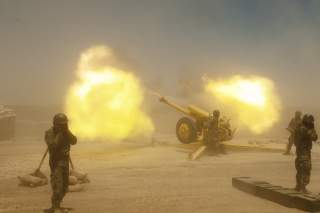Is H. R. McMaster Stuck in the 'War on Terror' Time Warp?
The art of the Afghanistan deal involves doubling down on the art of war.
With China investing in Pakistan economically though the China-Pakistan Economic Corridor (CPEC), it is developing a greater stake in Pakistani, and Afghan stability. The United States must leverage military aid to encourage tougher policies against terrorists, and keep open the option of unilaterally targeting Taliban targets in Pakistan, like it did in 2016 against Taliban leader Mullah Mansour. Curtis and Haqqani want to give Pakistan a list of calibrated actions for ending its support to the Afghan Taliban and the Haqqani Network, and lay out a timeline for specific actions. Failure to make progress on these steps could result in Pakistan’s designation as a State Sponsor of Terrorism. Similarly, Col. Robert Cassidy in the National Interest calls Pakistan a “geopolitical monster,” and outlines eight measures to be taken against it, arguing that “sticks and fear will work where carrots, cash, and cajoling have not.”
America First?
A group of former military commanders and ambassadors said in a 2016 letter to the president that “Afghanistan is a place where we should wish to consolidate and lock down our provisional progress into something of a more lasting asset.” That same year, a similar group of officials called Afghanistan “a key front in a generational conflict against violent extremists across the greater Middle East,” and a conflict we “cannot escape.” Former ambassador Ronald Neumann, retired Gen. David Petraeus, and former ambassador Earl Anthony Wayne wrote that to help win congressional and public support for a longer-term commitment, a clear but limited set of objectives, whose progress can be measured and reassessed along the way, is necessary. Former National Security Adviser Stephen Hadley along with Andrew Wilder and Scott Worden of the U.S. Institute of Peace, which the Trump administration has sought to eliminate, have described the current Afghan government as “a rare and willing ally at the epicenter of the fight against the Islamic State and international terrorism.” Most of the authors mentioned here have argued that the United States should commit to a long-term strategy of supporting the Afghan state and security forces, enable the Afghan forces to achieve battlefield victories, and take a creative regional approach to achieve a peace deal with the Taliban that prevents the reemergence of a transnational terrorist safe haven.
The McMaster faction in the Trump administration would have to make a realist case that “America First” in this case involves strong, but conditional, support for a currently faltering foreign government and military apparatus, and that the sacrifices by U.S. troops clearly serve America’s interests. They would need to convince a skeptical, Jacksonian President Trump that this is not the kind of naïve nation building he campaigned against, but a campaign to destroy radical Islamic terrorist groups threatening the United States, and extract the United States out of a never-ending fight with a marginally relevant Taliban.
A tall order, since the President himself tweeted in 2013: “Let’s get out of Afghanistan. Our troops are being killed by the Afghanis we train and we waste billions there. Nonsense! Rebuild the USA.”
Ralph Emmers is an analyst at a defense consultancy monitoring local and international media reporting on Afghanistan and Iraq. He holds a degree in Strategic Studies from Johns Hopkins University, School of Advanced International Studies.
Image: Afghan National Army soldiers during a partnership training program. Flickr/Department of Defense

